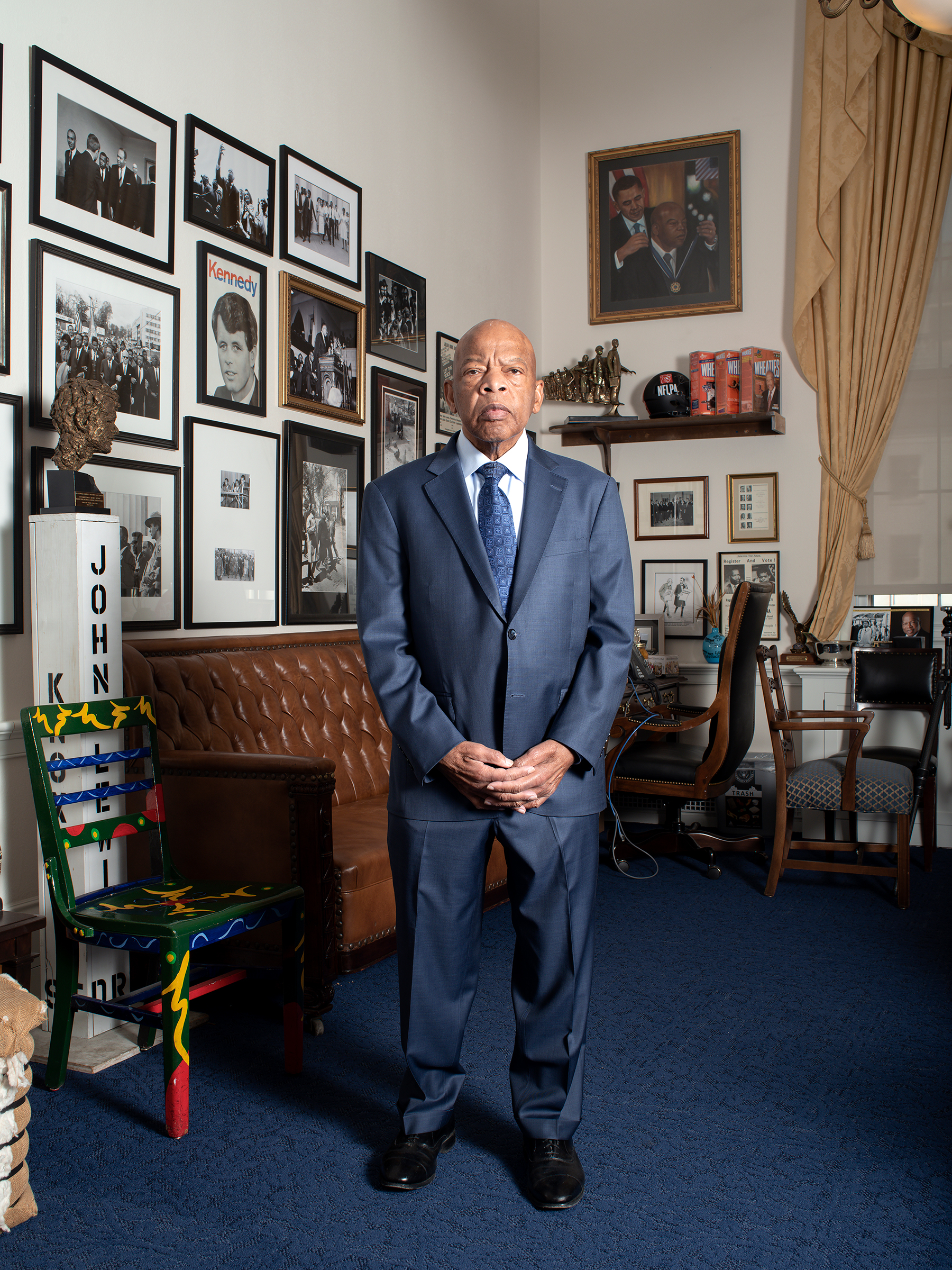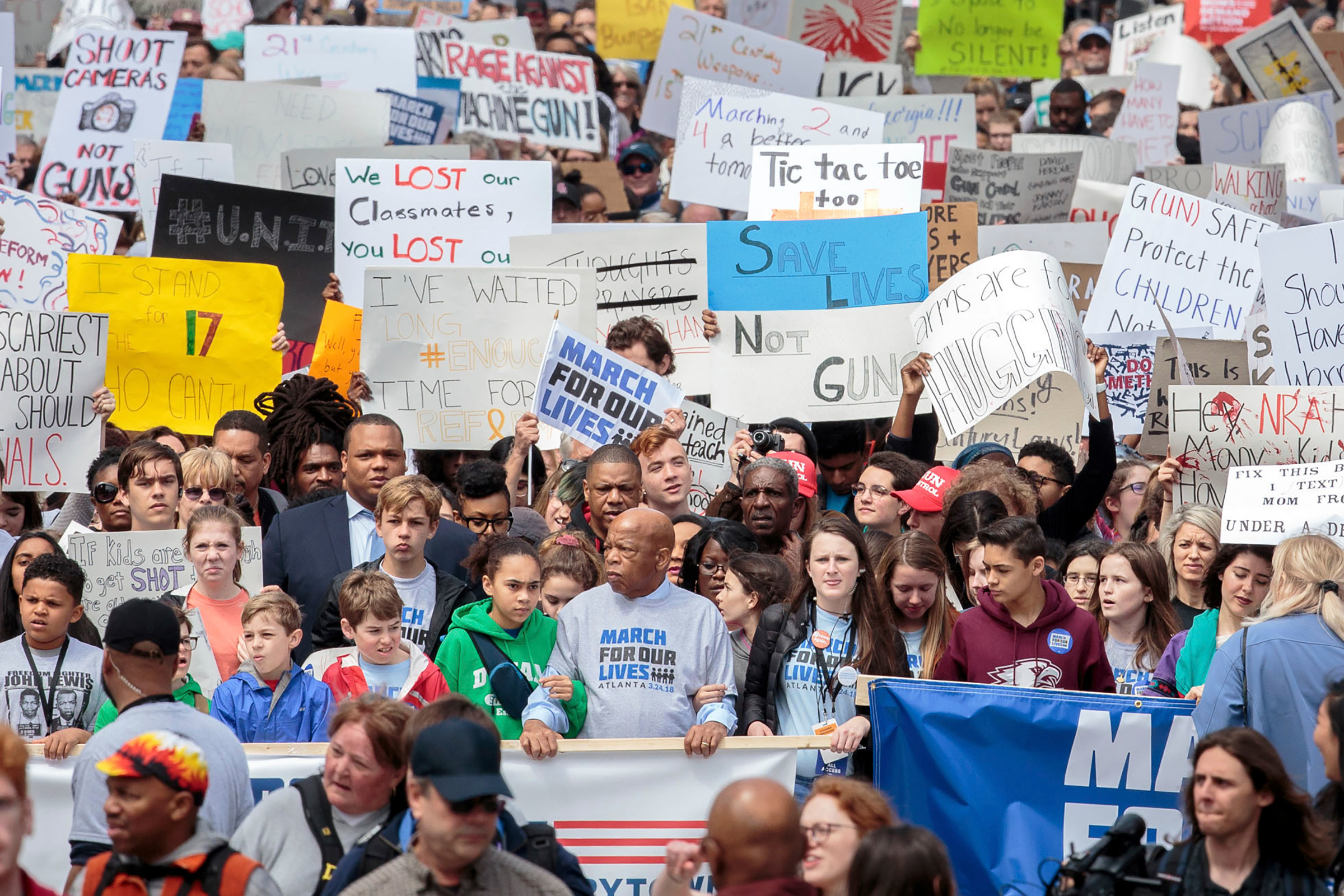
Our elders become our ancestors to remind us to be free. When Toni Morrison passed, it was this thought that brought me comfort. When the Rev. C.T. Vivian and Congressman John Lewis passed on the same day, it was this thought that fired me up.
I am blessed to be one of the thousands of activists who decide daily to get in Mr. Lewis’ favorite form of trouble: the good kind. We are strong in number. We fight the varied manifestations of oppression every day across the globe. We press for Green New Deals and for America to make good on its original ideals. We radically reimagine public safety and public health to prioritize care over punishment and fund wellness instead of violence. We protect the waters at Standing Rock and in Flint. We fight detention at Rikers and at the border. We take on anti-Semitism and Islamophobia. We say Black Lives Matter because we mean it—and we are unashamed to remind you that we mean all Black lives, the cis and trans ones, the disabled and abled ones, the women, the men, the gender-nonconforming and everyone who doesn’t belong to a binary.
No matter the work we do, all of us are clear: we stand on the precipice of transformation now because people like John Lewis tilled the soil. Though this transformation may seem sudden to those who are not ardent students of Black history, the seedlings of freedom have been planted over generations. Any change is the direct result of persistent freedom work and hands that never left the plow.
Among the greatest to farm the lands of liberation, John Lewis sits high in the American canon of heroes because his blood and tears watered the ground on which we now stand. There is no greater love than this: to risk laying down your life for your friends. Biblically, there is no act more moral. Politically, some activists may not have agreed with every vote or choice Mr. Lewis, the Congressman, made. But ultimately, the sum of his life is greater and grander than most humans could even imagine. Not a single solitary soul with any semblance of historical or moral understanding could ever deny how indebted our country is for his sacrifice. It is a debt that can never be fully paid.
And yet, as heroic as John Lewis’ proportions in life, which have only increased in death, he was our family. Despite his long and consequential life, a point of celebration which inspires deep gratitude, our grief is magnified because we lost someone who felt both immortal and intimate; someone far and someone so close.

It occurred to me, on the day of his passing, that at least half of my social-media acquaintances had met and taken a photo with John Lewis. At a book signing. A congressional event. A march or a meeting. Our heroes are rarely this accessible, but John Lewis was. Perhaps it was his deep rootedness in a Christian faith that champions humility in service of God’s will.
Mr. Lewis and I spoke several times—many of us organizers and activists considered his presence a gift of mentorship, whether we shared space one time or a hundred. The particular connective tissue, for me, was his faith. He often said that he once thought he’d be a preacher, and would preach to the chickens on farmland in Alabama in his formative years. At one time, I, too, thought this would be my path, but in him I saw someone who instead chose the ministry of social change.
Spreading the gospel of justice is an often demoralizing feat, and yet his hope remained consistent and his determination fierce into his elder years. I once asked him about this, and his response was candid but clear-eyed. “You will have setbacks,” he told me just a month before the 2016 presidential election—perhaps this was a warning—“but be consistent. You will get there.”
Any observation of John Lewis’ life, from his early years to his many terms in Congress, communicates a simple truth: courage is a discipline. In order for courage to change the course of history, as Mr. Lewis’ did, it cannot be episodic—it must be unwavering. We should count ourselves blessed to have witnessed a case study in the continual practice of the discipline of courage from a master teacher in our lifetimes.
Our elders become our ancestors to remind us to be free. So what kind of ancestors will we be? Daily, the sum of our future ancestry is being totaled. Will we choose mere words? Or, as Lewis’ compatriot and fellow hero the Rev. C.T. Vivian reminds us, will it be “in the action that we find out who we are”?
At bottom, those who herald John Lewis’ life but insult his sacrifice must be compelled to transform their practices. Political forces like the GOP, including its leaders in Lewis’ home state of Georgia, must be forced to part with their persistent practices of voter suppression—racist tactics John Lewis was clear to call out in life. He bled for the franchise: it is impossible to honor him and dishonor the vote. It’s past time we get in good trouble and get in the way enough to stand between the arm of suppression and Black bodies at the ballot box.
What kind of ancestors will we be? Prayerfully, ones that ancestors like John Lewis will welcome through the gates with open arms and beaming smiles of pride. That’s precisely how I imagine Martin Luther King Jr. welcomed John Lewis home.
Thank you, Mr. Lewis. See you on the other side. We hope to make you proud.
More Must-Reads From TIME
- The 100 Most Influential People of 2024
- The Revolution of Yulia Navalnaya
- 6 Compliments That Land Every Time
- What's the Deal With the Bitcoin Halving?
- If You're Dating Right Now , You're Brave: Column
- The AI That Could Heal a Divided Internet
- Fallout Is a Brilliant Model for the Future of Video Game Adaptations
- Want Weekly Recs on What to Watch, Read, and More? Sign Up for Worth Your Time
Contact us at letters@time.com